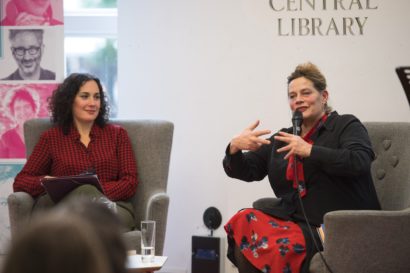 MLF Chapter & Verse
MLF Chapter & Verse
The Manchester Literature Festival Blog
Review: Deborah Levy
Our Young Digital Reporter Maygen Senior discovers a flow of ideas at Deborah Levy.
Deborah claimed her latest novel was an “easy birth… relatively”. The idea for her book, where Saul Adler, her protagonist, experiences life in 1988 and 2016, developed from watching tourists cross Abbey Road, being playful and re-enacting a part of history, while simply crossing from one side to another. The form of the zebra crossing raised questions for Deborah: where does it begin and end? With people crossing both ways, the lines are blurred.
The talk, like her prose, flowed effortlessly from one concept and theme to another. Deborah carefully unpicked the complex ideas of beauty and time in The Man Who Saw Everything, which Kate Feld called “stunningly ambitious”. Male beauty is just one of the things Deborah wanted to explore, as she mused about how intense beauty makes people stare when they feel they should not. She looked out to the audience, gazing round when she stated that she is deeply interested in how we think, as I am sure we all are.
Deborah contemplated time, and how we can view different times seemingly simultaneously, rather than as a linear concept. She considered how we daydream about the past and think about the future repeatedly during the present, and so in the book she wanted to honour our inner, unconscious lives and “work with expanded time”. She then read what Kate named the ‘Penny Lane’ passage, in which a single plastic bag from the future floats by. It’s these details that present the future trickling into the past, melting into one other.
Deborah recalls how disappointed she was as a child when she read Alice in Wonderland, and the story was revealed to simply be ‘all a dream’. She felt short-changed, and so to her, everything in literature must have a consequence, like real life, which adds a real depth and consciousness to her work. She is also influenced by visual arts, and Surrealism, as these allow her thoughts to drift off with a “freedom of imagination”. It is from this visceral flexibility that enchanting moments in the book grew, such as when the hospital is flooded and seals swim within it.
Deborah is now a third of the way through part three of her living autobiographies, which prompted Kate to question how Deborah switches registers between projects. She changes her tone to be more intimate yet formal, but she also added how “themes flow into each other as the same mind is writing them.” She is writing her autobiographies now in order to capture the mistakes of life within the storm, rather than waiting until she is older and more knowledgeable, since “that’s a bit dull, wisdom’s a bit dull”.
Deborah says she doesn’t want her autobiographies or novels to behave, as such. Imagine giving yourself the freedom to experiment and try, to make mistakes and question with wonder and curiosity, and to allow yourself time to consider and contemplate. Kate ends the talk by expressing that Deborah has “given us so much to think about” and, indeed, she has.
